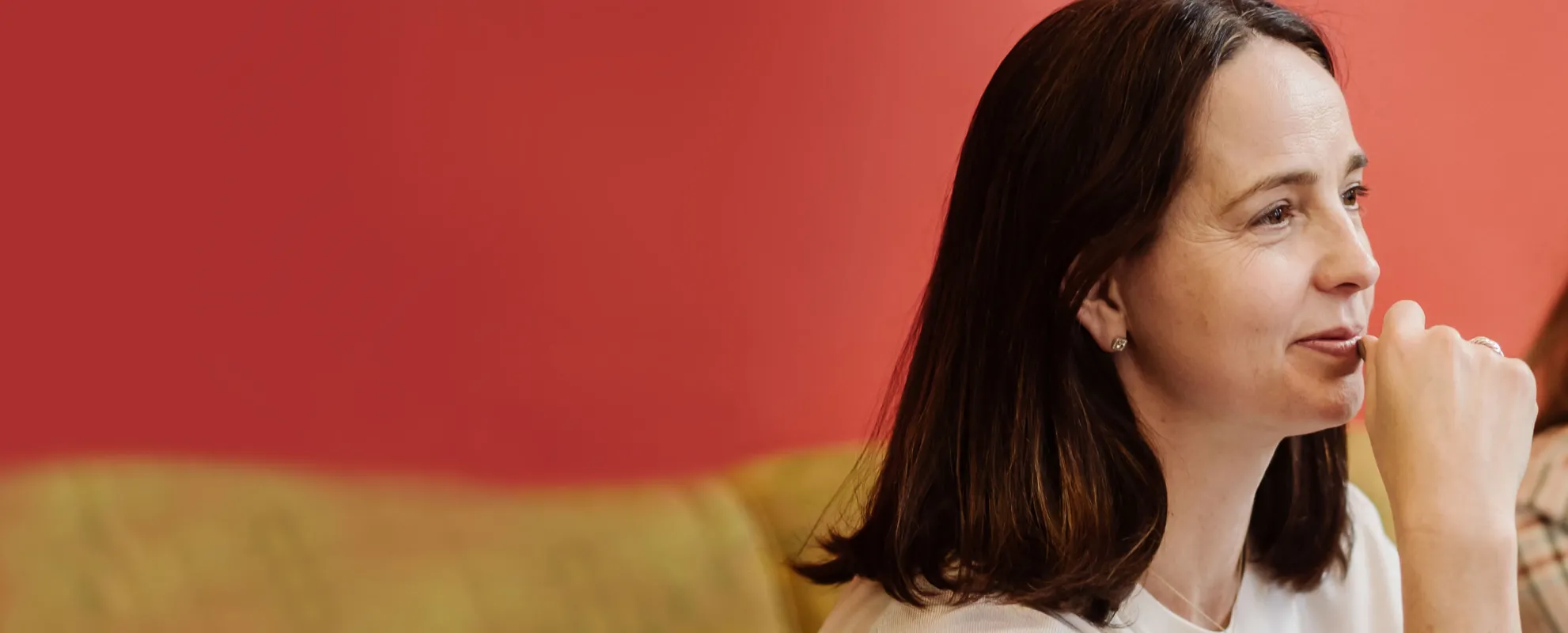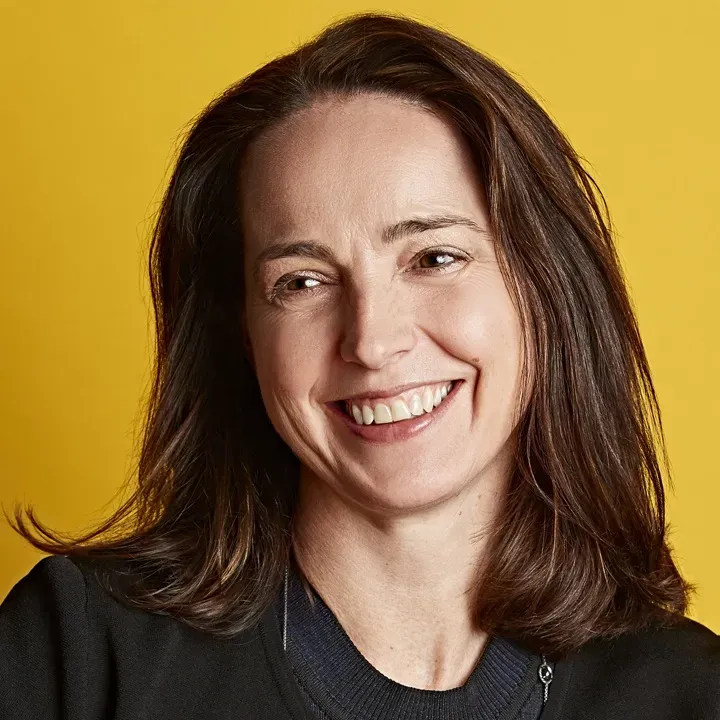Looking back, Sarah Friar says her journey from Northern Ireland-born metallurgical engineer into the top job at San Francisco-based Nextdoor began on the palm-lined road leading to Stanford Memorial Church at the center of campus.
It was the late 1990s and she’d enrolled at Stanford GSB with the support of her employer, the management consulting giant McKinsey. Arriving at the height of the tech bubble, she knew as soon as she got to campus she didn’t want to go back into consulting but wanted instead to make her own way in the tech world.
“I’m a doer,” she says.
Friar has been CEO of Nextdoor since December 2018. The privately held company describes itself as “the world’s largest private network for the neighborhood” and promotes better communication between people who live in close proximity. It launched in 2011 and is backed by prominent investors such as Bond and Riverwood Capital, which in September 2019 closed its $170 million growth round. The financing brought Nextdoor’s total raised to $408 million, according to Crunchbase, and increased its valuation to more than $2.1 billion.
For more than six years before that, Friar was CFO of Square, the mobile payment company for small businesses. The mother of two is a member of the Walmart board of directors and a director for the collaboration software company Slack. She also cofounded a mentoring program for female entrepreneurs called Ladies Who Launch in 2013.
You started as a metallurgical engineer. What pivots led you from that to Nextdoor?
I was an engineer at Oxford, and I’m a total geek when it comes to science and math. I did an internship in Africa in a gold mine. I loved the work, but I just felt like I could never be successful. It was a very male-dominated world, and so I came back to the UK and did a pivot to the white-collar work at McKinsey. I had a background in finance and ended up working mostly for mining companies. It was a nice way to bring together business and this fascination I had for more technical work.
And then you came to Stanford GSB.
At McKinsey you couldn’t be promoted unless you had an MBA, which they were kindly willing to sponsor. Everyone else was doing it. I felt incredibly lucky to end up driving down that beautiful road toward the church at Stanford. But I also knew right then that I didn’t want to go back to McKinsey. I’m a doer, and I don’t like handing stuff over to people to do for me.
What were your biggest influences at Stanford?
From a mentorship perspective, Garth Saloner was and still is amazing. He taught a course on strategy, and he’s just a clear-sighted logical thinker. Often, when I’m doing strategy with my team, or even just sitting down with a blank page myself, I hearken back to Garth.
How did you end up going from Stanford to Goldman Sachs?
I was Class of 2000 at the business school when the tech bubble was at its zenith, but I had a lot of debt, and I needed a visa if I wanted to stay. Goldman Sachs provided two things: money and a visa. Goldman turned out to be amazing. I thought I’d be there for a couple of years but I ended up staying with Goldman for 11 years.
Why?
They always did a great job of stretching me and finding the next job. At Goldman, I was an investment banker, a research analyst, I covered securities, I covered infrastructure, I covered applications, I covered all of software, then I became what was called the business unit leader for tech. Every time I felt like I had plateaued, they would find the next mountain for me to climb.
What convinced you to leave?
Ten years in, the financial crisis happened and I lost belief in what I did. I couldn’t find the purpose or the why. That led me to say, “OK, maybe I can be a builder.” And that was a big pivot. I went to Salesforce for a year and a half, but Square became the big unlock. That was when I realized, “Wow, I can really be part of building a company.” While I was there, we went from 200 people to 3,500. We went from private to public and we built a company that was valued at $30 billion. Not that valuation is everything, but I felt like we had built a company with incredible impact.
And then Nextdoor.
I came here because I wanted to do things that were really purposeful in life, that I felt would make a difference. There are very few companies like that, and Nextdoor is unique in terms of what its purpose and mission is.
Your Twitter page features a banner photograph of a little girl facing down the Wall Street bull. Why is that image meaningful to you?
I came from a crazy farm community in Northern Ireland, born during the Troubles. I feel a lot like that little girl sometimes when I look at what’s in front of me. But I’m totally fearless about it. It speaks to women on Wall Street, but I think women generally in business have it a lot tougher. We’re still kind of walking uphill. A fellow CEO said something to me last week about how, for women, it’s always like training at altitude. One of these days, when we actually get down on a level playing field, we’re going to totally nail it because we’ve trained at altitude.
You’ve written, blogged, and tweeted a lot about social isolation. Do you believe Nextdoor can help with that?
Technology has revolutionized our world, in many ways for the better. It’s a powerful tool that allows us to stay in touch with friends and family across the globe. It provides us with a source of endless information at our fingertips, and it entertains us. But, the reality is that while technology has done so much to enhance our lives, people are lonely and yearning for human connection. One of the first things I did when I joined was to do meetups in every country that we’re in, and a common theme about loneliness kept coming up. It didn’t matter if it was a senior or someone in their twenties. But what’s inspiring is seeing that people are using Nextdoor to connect with neighbors in the real world.
For instance, there was this wonderful Austrian woman in Paris who was the person in France on behalf of the Austrian government. She was an amazing woman for her generation in particular, and she spent the whole time telling me how lonely she was and how hard she found it to connect. In her area of Paris, a neighbor had used Nextdoor to create a Saturday morning coffee, chocolate, and chat, and she talked about how grateful she was that there was something to look forward to every week. We hear of similar stories happening in communities around the world, and it’s encouraging to know that people are using Nextdoor to come together and get to know one another.
You’ve said “time-on-app is a bad metric for us,” and I’m wondering how you address that in your family life?
We love to play games. My husband, who’s also a Stanford GSB grad, gets all the glory on this one. On a Friday night when we all get home from our various activities, work, or sports, he’ll be the one pulling out the Scrabble board or this other game called Small World.
But isn’t the point of your business to have people spend time on your app?
That’s often where investors want to drive companies. Yes, we’re a for-profit, so we have to build a real business, but we’re also very purpose-driven. We’re much closer in a way to companies like Patagonia or REI in terms of how we want our purpose and mission to come forward. At Nextdoor we’re pushing the idea of community vitality. That’s a way better metric than time-on-app.
Nextdoor recently introduced the “Kindness Reminder” feature that prompts people to reconsider their words before posting something mean-spirited. What results have you seen from this niceness initiative?
It is this idea of mindfulness and taking a moment to think before acting that led to the development of Kindness Reminder. This is a broader part of community vitality. We believe we can actually shift the tone and tenor of conversations in a neighborhood. We can’t fix everything, but we can certainly start to make some change. With contentious issues, we saw responses quickly escalate and people would become not-very-nice incarnations of themselves. So we spent a lot of time with academics, including one of my favorites, [Stanford social psychology professor] Jennifer Eberhardt, who wrote the book Biased: Uncovering the Hidden Prejudice That Shapes What We See, Think, and Do. In early tests we saw one in five people who saw Kindness Reminder hit “edit” on their comment, resulting in 20% fewer negative comments. Moreover, in areas testing Kindness Reminder, there has been a decline in how often it is prompted. There’s always more work to be done, but we think this is a step in the right direction in creating stronger local communities that promote open dialogue and inclusion.
What did you learn from their work?
A couple of things stood out to me. One is that when you slow people down, you give them a chance to move back into the cognitive part of their brain, so they get out of that reptilian brain, where their responses come automatically, into something where they can be more thoughtful. Tech is all about speed. Speed to post. Speed to reply. Speed to pick an emoji. It’s all about revving up the system instead of calming it and allowing thoughtfulness to come through.
Is there something about today’s current climate of online incivility that makes that kind of proactive intervention particularly necessary?
People have learned the behavior, and part of it is because they’re allowed to remain anonymous. Think about if you’re in an elevator and someone bumps into you; I bet you say, “Sorry.” They bumped into you, but you find yourself apologizing. That’s because you’re in very close proximity. If you’re in your car and someone cuts you off, you know you’ll probably never see that person again, so you’re more willing to be angry or aggressive. That’s what happens when we’re more anonymous. A lot of platforms have allowed a degree of anonymity, and that anonymity means people can be less inhibited. But it has also brought out the nastier side of human behavior. But I think we are seeing a shift and people are yearning for a more trusted, private way of connecting again. By requiring members to use their real name and verified address, Nextdoor creates trust and accountability. This encourages neighbors to be their best selves online, leads to healthier and productive dialogue, and inspires neighbors to lend a helping hand.
Photos courtesy of Nextdoor.com


